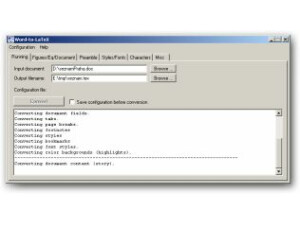
(authors will be provided with a link by the publication chairs) Authors of one-page abstract should submit publication ready source files (Word or LaTeX) using the sameĪCM Primary Article Templates (LaTeX or Microsoft Word This option is available to accommodate subsequent publication in journals that would not consider results that have been published in preliminary form in a conference proceedings.

#LATEX FOR WORD ACM FULL#
Authors should guarantee the link to the full paper to be reliable for at least two years. To accommodate the publishing traditions of different fields, authors of accepted papers or posters can ask that only a one-page abstract appear in the archival proceedings, along with a URL pointing to the full paper. Problem statements that can lead to new research directions regarding expanding access to technologyĪCM COMPASS 2021 specifically aims to forge stronger relationships between practitioners and researchers. Tools and models to simplify deployment, operation and scalabilityĭetails of technical infrastructure and services Strategies for sustainability and maximization of impact

Topics of interest include, but are not limited to:Įvaluations of usage, performance and impact of technologies deployed in the field, including social dynamics and unsuccessful attempts Practitioner reports will discuss approaches used in deployed technology, with the aim to inform on particular aspects of technology used in practice, or describing broad project experiences, including failed attempts. This track takes long papers on deployment experiences and short papers on practitioner reports, such as from NGOs and not-for-profit companies rolling out new schemes using technology. Submitted papers are expected to present an argument for the (either realized or potential) social impact of the work. We encourage (but do not require) real-world deployment and evaluation of methods in collaboration with public sector partners such as government or NGOs. Methods may be applied to relevant areas, including but not limited to: agriculture, poverty mapping, disease surveillance, speech interfaces, computer vision techniques, etc. Handling of missing, messy, and biased data, including data cleaning, data wrangling, data integration, and domain adaptation methods.Īnalysis of massive, complex data sources, such as networked data, satellite data, mobile phone data, time-series, and spatial-temporal data.įATE (fairness, accountability, transparency, and ethics) in AI and ML.

Methods for large-scale data analysis, participatory sensing and crowd-sourced data collection. Topics may include, but are not limited to: This track takes paper submissions for new research and development of AI/ML and data science techniques in the context of sustainable societies.

We also welcome research on the ethics of technology, especially from a critical perspective, that explores limitations and concerns with technology-led solutions for sustainable societies. The conference has a particular commitment to approaches and research that address the challenges faced by under-represented and marginalized communities.ĪCM COMPASS 2021 aims to explicitly promote multi-disciplinary and cross-disciplinary research and practice-including new research methods & practice and innovative approaches to design, systems & evaluation-that address key challenges for sustainable societies, including (among others) equality, health, education, poverty, accessibility, conservation, climate change, energy, infrastructure and economic growth. That support the growth of sustainable societies worldwide, including computer and information sciences, social sciences, environmental sciences and engineering. Inspired by the broad agenda of the United Nations Sustainable Development Goals (SDGs), ACM COMPASS 2021 aims to be a forum for the presentation and publication of original research from a broad array of disciplines


 0 kommentar(er)
0 kommentar(er)
